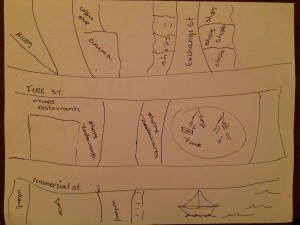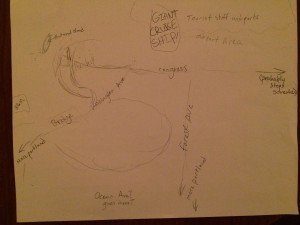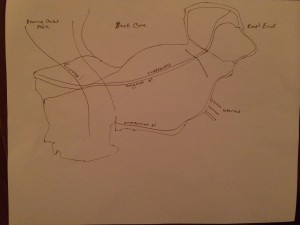It came recommended by not one, but two friends. It was built into an old gas station, but didn’t sell gas. It had a memorable logo that was at once cute and minimalistic. It was Tandem Coffee Roasters, and it was empty.
Of course I could not conduct an ethnography in an empty café, but, in Portland, such eateries have propagated like horny rabbits with extra sex organs – there would be another. The proximate sibling happened to be Speckled Ax. I ordered a cup of drip, sat down, and initiated that passive, temporary sort of stalking that we all now know and love: the ethnography.
4:10
Arrived at Speckled Ax Café on Congress Street
A generally young crowd, with the single exception of a middle aged woman discussing the prospects of graduate school with an enthusiastically gesticulating woman who is (you guessed it) young.
Young (half black?) man with a beautiful brown pitbull sits at the table across from mine talking with another young woman. A young woman with short blond hair sits behind them, working on her mac pro – engrossed and wearing a black hoodie.
I am sitting in the middle of them in a row of tables, aligned by a long bench that juts out from the brown walls. To my left is another young woman working quietly at her laptop, and to the left of her is a young woman who appears to be reading a book (but her back is to me).
There are a group of early 30s (?) white men beside me discussing a messy roommate and moving to one of their girlfriends’ places (hipsters).
4:20
Woman with the guy with the pitbull gets up to go to the bathroom. He takes pictures of his dog on his iphone. Another young man strolls quickly into the café – says hi to the pitbull guy, they appear to be friendly.
4:30
A couple shows up and walks to the counter to order. They stay standing there, and talk to each other until their coffee is ready and they leave. The group of hipster men beside me leave, but one has left their iphone and espresso on the table.
4:40
The hipster guys are back, minus one. Strong tobacco smell.
There is a young woman sitting at the table beside me also working on her laptop (not a mac!) The guy with the pitbull and friend discuss weed and alcohol. She doesn’t drink much and he doesn’t either, but he smokes “like, every day.”
young woman who was been working at the bar (not making coffee, on her laptop. there’s a small counter to work at) gets up to leave. Drinks water first.. I feel creepy watching all of this and writing it down. As she leaves, finally, she says hello to the hipster guy who also knew the pitbull guy. The hipster guys also leaves, but not with her.
4:50
Young woman sitting next to me packs up to leave, and the woman at the table across from me (black hoodie, engrossed in work) has also left. Meanwhile, the pair discussing grad school remain locked in conversation. It’s just me and these two talking pairs now. And the two employees chatting in the back.
5:00
Both pairs are still talking and no one has come in, though there is a lot of foot traffic outside. The pair across from me have their iphones out and are discussing them.
5:10
The pair across from me leave after friending each other on facebook. The pair to my right are still talking, but it’s just us three here now.
—
I needed paper and the Speckled Ax had emptied out. After grabbing a few sheets at Kinkos, I moved to Arabica café.
—
5:15
Much more diverse crowd. 14 people by my count.
In the front sections there is a middle aged woman reading the newspaper by the window, and a younger woman using a macbook air. There is a very stylish and tattoed man at the table beside her, also on a mac laptop. Then, at the table by him there are two women sitting quietly – one on a laptop, one reading. At the tably beside them there is a woman with over ear headphones and an IBM laptop working. Further down the cafe there is an older man in a tshirt tapping away at an ipad. A couple of seats down there is a small group of three skater-types, two guys and a girl (college age?). Towards the end of the cafe there are two couples quietly working.
5:25
One of the skater people leaves.
A group of three young women come in and head straight to the back of the café.
A middle aged woman enters and orders a drink – then sits on the couch behind the bar by herself, reading on her iPad mini.
5:35
The older woman by the door leaves, but the newspaper remains on the counter. Another middle aged couple come in and take her place. Two Bowdoin students show up and take a table in the back.
6:00
Café is closing; I have been asked to leave.
Mental Maps
Name: Savannah
Age: 20
Gender: Female
Occupation: N/A
– Grew up in Portland and lives on Munjoy Hill.
– Really likes Portland and didn’t have many problems or ideas.
– Thinks that humans shouldn’t have to work to have a home, and would like to have housing be free. Wants to see more community sharing of land.
– Wants trash bags to be cheaper
– Feels that she is approached by “narcs” a disproportionately large amount.
Name: Tim Wilson
Age: 28
Gender: Male
Occupation: Painter
– Grew up further North and has lived in Portland for five years. Currently resides in West End.
– Likes the trails in and around Portland, and biking up and down its hills.
– Thinks parking is a big issue. Wants to revamp the buses. (“Who takes the bus?” he asked. “It’s a cultural issue.”)
– Likes the park, but events are few and do not appeal to his interests.
– Would like to see more going on than just restaurants and bars.
(Note: Tim’s drawing is really cool looking, and it turns out he is a very talented artist: http://www.timothypowerswilson.com)
Name: Stella
Age: 55
Gender: Female
Occupation: Special Education Teacher
– Moved to Portland 22 years ago
– Panhandling is uncomfortable. She identifies as politically far left, but thinks that panhandlers are bad for tourism (take up benches, accost tourists), and make the city less welcoming.
–Thinks that Prebble Street or other organization should focus on getting homeless people to work, possible in an agricultural setting. Thinks farming could be very therapeutic. Wants the homeless to feel useful.
– Loves famers’ market and food coop, wants more local food.

Name: Laura
Age: 29
Gender: Female
Occupation: Marketing
– Grew up in Portland
– Wants better parking, affordable housing, and more sustainable development / sustainability projects in general.
– Thinks that homelessness is a big issue facing the city.
– Idea: bring back the train around the peninsula!

My time in these Portland cafés, and my discussions with this small sampling of its inhabitants, suggest that these middle class citizens are generally very happy with Portland as it exists today. The most pressing issues of daily life in the city seem to be parking and homelessness. Of these, homelessness was very clearly more significant.
In my own evaluation, Tim’s desire for more cultural attractions that go beyond bars and restaurants was a subtle but important one. It seems that the restaurants in Portland have assumed the role of old Boston’s pubs, Paris’s cafés, and LA’s pool parties – stoking the flames of a burgeoning culture that will inevitably spill over to other arts and activities. It also struck a strong chord as San Francisco citizens currently face a similar issue, but from a very different angle. While SF has long been home to an impressive variety of cultures and attractions, the recent tech boom in the city has sparked a steep increase in swanky bars and dressed-down, but still high end restaurants. The parallels don’t end there – San Francisco also faces a large and very present homeless population. Perhaps lessons learned in addressing cultural development and homelessness in Portland can be applied to San Francisco as well.



Great writing. Very fun to read your ethnography and analysis of maps. Homelessness was an issue mentioned by my mental map participants, as well, but I appreciate the comment from your participant that actually details a possible solution! I had a crazy idea a few years ago to use a stationary bike that put electricity back into the grid as part of a prison program to lessen sentences. I think it’s already been done in Brazil, but the concept could easily be applied anywhere in the world where homelessness is an issue. Instead of reducing a sentence, however, the biker could earn money or credits for pedaling. I’m not sure what the technological needs are to install these around Portland, but it could be a cool investment.
I love how much your writing reads like a story. I also really like the varying ideas your mental map participants had for a smarter Portland. One of the people with whom I spoke said almost the exact same thing about the bus system – he wanted a complete overhaul of the bus system because he felt that no one used it because no one COULD use it because of its lack of real functionality. I also personally agree with Tim’s idea about cultural attractions other than bars and restaurants. I often have trouble when I go to Portland because all the shops close reasonably early and before dinner time, but I can never figure out what to do between walking around downtown Portland and going to dinner. Yes, there is the Museum of Art and lots of galleries, but I have never been a big visual arts person so I have always struggled finding other activities.
Your ideas are very well expressed and it was interesting to read you cafe ethnography and maps!! You did an excellent job at looking at the city as a whole and not just analyzing certain groups and ares that make up the city. One of the people whom I spoke with agree with Tim’s desire for more cultural attractions in the city of Portland. The person whom I was interviewing stated that they could not see themselves in any of the attractions of the city. I think that it is very important for Portland to have a little bit of everyone it. If someone cannot imagine themselves as a part of the community and different activities of that community, it creates a very divided sense of self in a city. Therefore, what kinds of cultural attractions can you suggest to the city that are going to include everyone or rather include other groups that are currently not being consider the target audience?
As the other have noted, your writing is very easy to read. I enjoyed the narrative style and really enjoyed your ideas in the last paragraph. Gentrification, the lack of diversity among cultural destinations, and homelessness are some of the most important issues affecting both Portland and San Francisco and many other cities. You are certainly right that we need to draw from more of the solutions being proposed to these issues in other cities.
I also visited Speckled Ax for my ethnography and saw that these hip place seemed to frequented by mostly students or young people who would work on their laptops. I think the cafe’s location on Congress Street close to to MECA contributed a lot to this consumer profile.
Homelessness is definitely a pressing issue. I also really agree with Stella’s comment about putting homeless people to work. Perhaps Portland could offer policy accommodations to firms who would hire and help make these current homeless people’s lives more productive.
Your ethnography is narrated like a story within a cafe and creates a nice flow. This makes it really easy to read. The variety of people you accounted for shows the diverse opinions of community. Some people do not see themselves really integrated to the city. However, it depicts the other people’s interest in creating a stronger community sense. During my search for mental maps, it seemed some people did not mind how the city was, and their thoughts on improvements were basic response like roads and parking. Which are big issues in many cities. Your thoughts and parallelism of San Francisco are interesting and shows the large gentrification issues in these growing tech cities. Consider how the tech boom started earlier in San Francisco and growing even faster is creating a larger homeless population in the are than Portland where the start-up boom is slowly increasing.
Actually the homeless population in SF is pretty much static now, and the rate of chronic homelessness has been more than halved since 2009. Also, I just did a bit of reading and it turns out that the mode and average ages of the homeless population have been rising linearly over the last decade, so it is likely a stable group of individuals.